By Kabil Bushati
Memorie.al / Ulcinj, a small town on the Adriatic, until 1878, was almost unknown to Europe, but then it conquered the European newspapers, reporting on the Albanian resistance, against everyone. The fame of this war crossed the Atlantic and occupied the pages of the “New York Times” newspaper. It was one of the pearls of the Adriatic, which was being forcibly separated from Albania by the Berlin Congress. The fame of this war crossed the Atlantic and occupied the pages of the “New York Times” newspaper. It was the most important port in the north, through which Shkodra developed its trade in the Mediterranean and beyond.
It was one of the gravitation ports of Shkodra. By decision of the Congress of Berlin, Ulqin, Tivari and a part of Shkodra Vilayet were granted to Montenegro. In 1860, Ulcinj had 190 sailing ships; at present it has not more than 80 to 90 vessels exclusively engaged in a trade along the coast. Once upon a time, before the existence of a separate Austrian fleet, Ulcinj was a notorious pirate base, fully moored with 400 pirate ships. At that time, the new town had 2,800 inhabitants, Mohammedan Albanians, twelve Serbian families, with about eighty people, belonging to the Greek Orthodox Church, eight Albanian Catholic families, with forty people, and about a dozen inhabited huts, of eighty children.
In the Congress of Berlin, Montenegro entered with a total area of 4,700 km. 2, but after the end of the Congress, it came out with a doubled area: with 9,100 km. 2, plus access to the Adriatic Sea, with the right to sail its ships through Lake Shkodra and across the Buna River, as well as international recognition of its independence. Even Buna was split in half. The state of Montenegro was being created, at the expense of Shkodra?!
For Ulqin, the role in this crucial event of our history, of the Dragusha family in general, and of the three brothers: Ibrahim, Abdyl-Fetah and Hysen, of this house in particular, attracted my attention. This house stood like a majestic castle in the middle of Perashi. There were around the venerable houses of Reçve, Kalace, Kamata and Dajti. Shaban Aga Dragusha’s family was very old in Shkodra, her sons had started to make a name for themselves in Shkodra. There were five sons, but two died early. The eldest son was appointed border commander in Shkodër, thus helping to introduce Hysen into commercial relations, which recovered the family’s economy, as the profits were very large, at that time, when trade was carried out through the Buna River.
While the other two brothers, Ibrahimi and Abdyl-Fetahu, conducted madrassas, even Abdyl-Fetahu went to Istanbul, where he graduated in the field of Theology. The love and abnegation for the homeland of these brothers found its highest expression, when by European diplomacy, the Albanian lands were designed to quench the insatiable hunger of our chauvinist neighbors. In the years of the League of Prizren, their energies exploded with their full potential. The names of the two, Hysen and Abdyl-Fetah, are reflected in the commission lists of the League of Prizren branch for Shkodra, or as it was called in the popular slang “War of Miletus”, while the other brother, lbrahimi, was part of the Executive Committee of the Branch.
We find his signature next to that of Daut Efendi Boriç, and other members of the branch, in the prayer he addressed to the consuls who were in Shkodër, to save Hoti and Gruda, from the annexation of Montenegro. We find such a thing in the protest drawn up for the defense of Ulcinj. He was present in the telegraphic conversation that took place with the Minister of War, H. Pasha, on August 27, 1880, from the Shkodra post office. Considering that Shkodra had in the center of attention the settlement of many refugees, who had flooded into the city from the border areas, such as: Podgorica, Shpuza, Zhabjaku and Nikshiqi, we are not wrong to assume that, in the relevant commission, there should be one of the Dragusha brothers was activated.
We are quoting from the “Letters of the Çoba brothers”, a passage that affirms exactly the above role in the events in question: “…The Commission charged Hys Dragusha to advise Filip Berović: Keep your mouth shut and relax, in your work”, because otherwise he could suffer it with his attitude. About the Dragusha brothers, it is also mentioned in the documents of the Austrian archives: where it is reported that; they were leaving no stone unturned to prevent the surrender of Podgorica, Montenegro, by Turkey, explaining this interest of theirs, with the fact that, allegedly, this abandonment would affect the interests of the Dragusha family.
Meanwhile, the Great Powers intervened diplomatically at the High Gate, but as always, not wanting to go to war with the Albanians. The Empire deliberately delayed surrender. To put it in front of the done act, Gladstone – Prime Minister of England – thinks to make the Ottoman Empire’s ports, especially the port of Izmir, in order to have it as a material guarantee for Ulcinj. These new steps of England forced Turkey to take serious measures for the surrender of Ulcinj, Montenegro.
The fear of the invasion of Izmir, where the largest customs revenues of the Empire were extracted, convinced Turkey that the issue of Ulcinj could not continue any longer and replied that; would take measures to deliver it immediately. Seeing that Turkey had put its shoulders against the wall and could not act otherwise, the Commission of the League of Prizren, answered fire after fire with concrete actions.
From these materials, it is also understood that the Hysen and Fetah brothers were members of the League’s commission and that they were friends with the English consul Green, proof that they were influential people. Given that the dedication of the three Dragusha brothers, to the issue of Albanian lands, did not match the policy followed by the Austrians and European diplomacy, the Austrian consul expressed unfriendly considerations in their address, especially to Abdyl Fetahu, because, referring to Hysenit, characterizes him like this: “…the brother of Hoxha Dragusha (read: Abdyl-Fetahut, our note), who is known as a dangerous troublemaker and troublemaker”. So, they left no way without discrediting Hysen, but public opinion spoke differently. The Montenegrins tried to assure the Albanians that it was not Montenegro that sought to annex Ulqin and Tivar, but that is what the Great European Powers had decided.
Krajl Nikolla is very worried by the unforeseen situation and hurries to assure the Albanians that he does not want to attack Albania again. But the League already exceeds itself and gives the order to attack Montenegro. Only the intervention of the Great Powers will be the external agent that will save Montenegro from the Albanian rule. Two years had passed since the infamous Congress of Berlin and the border question, between the High Gate and Montenegro, had not been resolved. The Albanians were in safe positions and did not give ground. At the proposal of Austria-Hungary, the idea is thrown that Montenegro should be given the city of Ulcinj with its surroundings, because its geographical position was more favorable than the previous provinces, which were mountainous. After receiving the approval of the Great Powers, the army of Montenegro moves towards the city of Ulcinj, organized into 22 battalions.
The League, for its part, charges the Shkodra branch, for the organization of the city’s defense. 270 people from Shkodra immediately responded to the call, and after them, the commander-in-chief appointed by the League for the defense of Ulcinj, Jusuf aghe Sokoli, left with another 500 people from Shkodra. He was joined by 300 other Albanians, under the command of Haxhi Mehmet Beci and Mehmet Gjyli.
The government of Istanbul took other coercive measures against the Shkodrans, to ensure the surrender of Ulcinj without a fight. She decided to take advantage of the division that deepened in the Assembly of Dibra and put an end to the resistance of the League, for the protection of Ulcinj. On October 25, 1880, the High Gate removed General Riza Pasha from Shkodra and instead sent Marshal Dervish Pasha, accompanied by 21 battalions and equipped with exceptional power.
He was appointed extraordinary commissar and commander-in-chief of the Vilayet of Shkodra. To avoid the wells of the Albanian forces, Dervish Pasha traveled from Istanbul to Albania by ship. As soon as he arrived in Shkodra, on November 3, 1880, he gave an ultimatum to the Interprovincial Committee of Shkodra to withdraw the Albanian volunteers from Ulcinj. Before and during the Berlin Congress, the Montenegrin delegate to the Congress stated that; the rights of Montenegro should be more extended. He especially emphasized the border line with Albania and proved that without the fertile lands on the coast, Montenegro would not be able to live. While Count Petar Shuvallovic, by order of his Russian government, asked the Congress to give Montenegro the requested region up to Buna and Shkodër. Montenegro was not satisfied with the decisions of the Congress of Berlin.
This was also expressed by Prince Nikola, when he emphasized: “The hardest thing for me is that outside the borders, the Buna River, the artery of our life, and Ulqin remain.” The prince ordered Stanko Radonić, before he said goodbye and left Berlin, to inform every member of Congress that Montenegro had not been rewarded fairly and that the new borders had been unjustly determined. This showed that from the Congress of Berlin, Montenegro had tendencies towards the coast and its ports, behind which Russian diplomacy stood. The non-realization of the decisions of the Congress of Berlin, from the High Gate, as a result of which, on the international stage, the Great Powers brought up the issue of Ulcinj, made Russian diplomacy go towards its goal, for dominance in the Balkans and the Mediterranean.
The pressure of Russia, in the direction of the great powers, for the surrender of Ulcinj, caused all measures to be taken and the last ultimatum to be given to the High Porte, in the implementation of the agreement. The authorization of Dervish Pasha, for the implementation of the agreement, showed the determination of the High Gate, in the final realization of the agreement. The Great Powers threatened the Ottoman Empire that if it did not force the League of Prizren to surrender Ulcinj to Montenegro, they would intervene in Ulcinj with their war fleet and at the same time they would disembark at the Turkish pier of Izmir. The Committee of the Albanian League for Ulcinj responded by announcing that; to protect their lands and their homeland, the Albanians were determined to fight against the Ottoman Empire, or the Great Powers.
Dervish Pasha, at first, used the diplomatic aspect, with the aim of reaching an agreement with the Albanians, so that Ulqin would be surrendered peacefully. The fear of the invasion of Istanbul, in case Ulqin was not surrendered, was the report of Captain Sale, on November 10, 1880, where he said that; Dervish Pasha appeals to the Albanians of Shkodra that the surrender of Ulcinj must be done. At this time, the territory of Ulcinj was under the control of the volunteer forces of the Albanian League, which were directed by the military headquarters, formed for the defense of Ulcinj. Under his leadership, according to the most accurate data, there were 2,000 volunteers, stationed in Ulcinj (of which 800 were from Ulcinj) and another 2,000 in the Tuzi sector.
At the beginning of November, when Dervish Pasha was already settled in Shkodër, hundreds of other volunteers arrived here from Tetova, Shkreli, Dibra and Kelmendi, and about 4 thousand more were expected to come from Prizren, Gjakova and Dibra. The pressure that Dervish Pasha exerted, from November 7 to 16, 1880, on the Interprovincial Committee of the League for Shkodra, to force it to surrender Ulqin, did not yield results. Even the Committee of the League for Ulcinj, in the petition it sent to the Great Powers on November 16, expressed its determination to protect the city. The spirit of resistance, had included the entire population of the city.
In order to speed up the surrender of Ulcinj, the English consul (K. Grini) and the Austro-Hungarian consul (F. Lipih) were engaged in Shkodra, who, in agreement with Dervish Pasha, exerted pressure on the Interprovincial Committee of Shkodra, to convince him to give up the protection of Ulcinj.
Against this, the foreign consuls would intervene with the sultan to give the Albanians autonomist rights. Faced with the pressure of Dervish Pasha and the promises of foreign consuls, on November 17, 1880, many members of the Interprovincial Committee of Shkodra declared that they would give up armed resistance in Ulcinj. Meanwhile, many of the representatives of the moderate wing had capitulated to Dervish Pasha and had gone so far that a few days ago, they telegraphed the Assembly of Dibra that they did not need help, as they had decided to hand over the city.
Their capitulation caused the revolt of Shkodra patriots, who formed a new committee of the Albanian League for Shkodra. In the new committee, which was established on November 19, 1880, the determined partisans of the armed defense of Ulcinj, such as Selim Efendi Çoba, Isuf Sokoli, Fetah Dragusha, Filip Çeka, Ahmet Efendi Bushati, etc., entered.
Three days later, on November 22, 1880, while Shkodra had not yet overcome the internal political crisis, Dervish Pasha ordered the Turkish army to start the march to Ulcinj. That day, the Turkish armies met the Albanian forces at Kodra e Kuqe, near the village of Klesna. At first, the Albanian volunteers pushed back the Turkish armies, but later, after other Ottoman units arrived, equipped with modern artillery, the Albanian forces were broken. Their commander, Isuf Sokoli, was seriously wounded and died a little later.
“From the side of the Albanians, Abdyl-Fetah Dragusha started the rifle first, followed by the others. Osman Pasha, as quickly as possible, gave the order to the army to attack, but at first, it was broken and then, receiving new help, he attacked again…”, while Xhevat Repishti, expands the frame: “It is the Albanians who , after hearing the words of a prominent activist of the Shkodra Committee, Abdyl-Fetah Dragusha – Vëllezr, let’s die for the given allegiance (Albanian allegiance) and for the country, with rare courage, attack the Turks, regardless of the numerical superiority, as well as the artillery”.
In the documents of the time, it is said: “Finally, one of the members of the League, appealing to himself, to protect the faith and the homeland, shot at the Turks.” His heroic act was also immortalized by the anonymous poet:
“The commission of this nation
We used to gather at Dragusha’s house
Who did it first?
– Hoxhe Dragusha shot a rifle…”!
After the Albanian army was defeated, the Turkish forces continued their march and entered Ulcinj on November 23, 1880, which they then handed over to the Montenegrin armies on November 26. Together with the surrender of Ulcinj, the issue of the northern borders came to an end, which had worried not only the Ottoman Empire, but also European diplomacy for almost 30 months. However, even though the issue of the Turkish-Montenegro border was closed, the fight that the Albanians waged against the brutal blackmail of the Great Powers and the military intervention of the High Gate, left a deep impression on the public opinion of Europe. Not only in the press, but also in some European parliaments, voices of protest were raised against the policy of the Great Powers, which decided to use warships to suppress the national rights of the Albanian people.
“The border line, completely in order, gave Tivar to Montenegro, but for this, the area of Ulcinj was violently taken out of the economic interests of the Shkodra region and attached to the foreign creature, the phantom state of Montenegro”, – he wrote the Czech researcher, Viktor Dvorski, emphasizing that, for the Montenegrins, Ulcinj was “distant, foreign in terms of language, religion and economic opportunities”. After the entry of the Montenegrin troops, 413 families left Ulcinj, with about three thousand members, which was even 40 percent of the citizen population, who mostly moved to Shkodër and Durrës. The Montenegrins took their properties. Some ancestors took the stones from the walls of the Castle to build their houses.
Krajl Nikolla, wove a poem for Ulqin, this pearl that was taken from the body of Shkodra. Abdyl-Fetah Dragusha also played an important role in the accommodation of Ulcinians in Shkodër, dealing with their organization and systematization. Abdyl-Fetah Dragusha, died sometime in 1892, leaving an honorable memory for himself and his family. The Dragusha brothers left many grandchildren and today, they have dozens of great-grandchildren. The communist dictatorship treated this family very cruelly. Mustafa (CAF) Hysen Dragusha, was sentenced to be shot in 1948 after an ordeal in the investigator. He was shot for the Postriba Anti-Communist Uprising. Also, members of this family have suffered in the prisons of communism, 33 years in prison. How bitter was the fate of this family…! Memorie.al




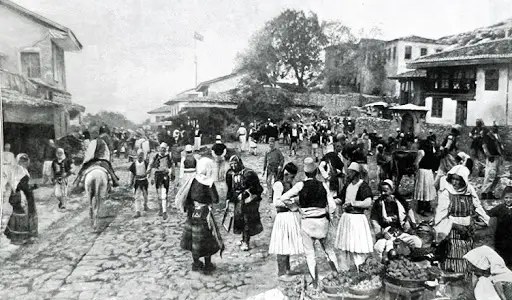

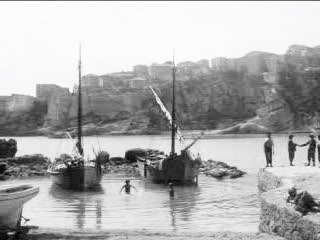
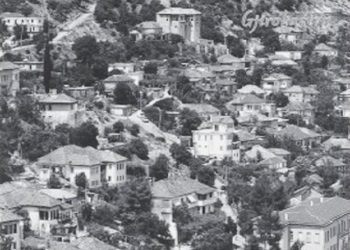
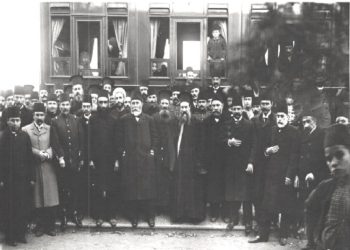
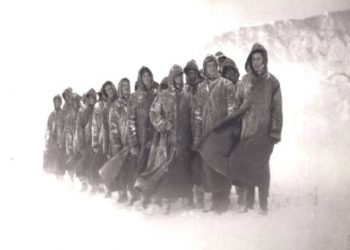

![“When the party secretary told me: ‘Why are you going to the city? Your comrades are harvesting wheat in the [voluntary] action, where the Party and Comrade Enver call them, while you wander about; they are fighting in Vietnam,’ I…”/ Reflections of the writer from Vlora.](https://memorie.al/wp-content/uploads/2025/06/admin-ajax-4-350x250.jpg)

